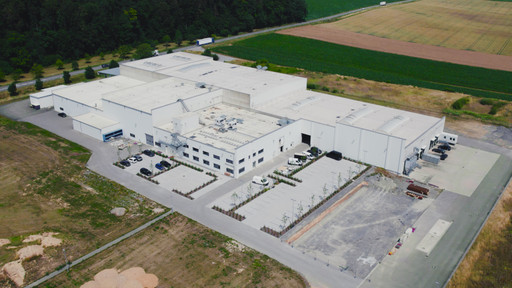Valmet Automotive has started the series production of battery systems in Kirchardt, the Finnish company's first battery plant in Germany. The plant near Heilbronn manufactures high-voltage systems for electric vehicles and plug-in hybrids.
The current first program for the Kirchardt plant is a small-series production of modules, packs and the battery management system (BMS) for the PHEV version of an exclusive sports car brand. Pre-series production for the first large volume order for another customer, a German OEM, is scheduled to start summer 2023.
Recruiting for the plant’s various positions is already underway, however most of the needed workforce of around 150 will be coming on board during 2024. Currently the plant has a workforce of around 60 employees.
- Since the start of production at our first battery plant in Salo, Finland, in 2019, we have delivered over 1 million battery systems for our customers’ hybrid, plug-in and fully electric vehicles. The plant in Kirchardt, our first in Germany, will further strengthen Valmet Automotive as a leader in the production and development of battery systems, says Jyrki Nurmi, SVP of the EV Systems (EVS) business line, Valmet Automotive.
Valmet Automotive now operates three battery assembly plants, two of them in Finland at the Salo and Uusikaupunki sites. The battery production facility in Uusikaupunki, which opened in September 2021, is located under one roof with the local car plant. The battery assembly is embedded into a strong internal development and production network, e.g. the battery modules for the Kirchardt production are produced in Uusikaupunki.
The decision to build a battery assembly plant in Germany was made after Valmet Automotive was nominated by a German car manufacturer as the system supplier for a new battery program. The program requires battery assembly to take place close to the customer to save resources and to minimize transports.
Another important factor is the proximity to the company's development sites in Munich and Bad Friedrichshall, where the company operates a full-scale high-voltage battery test center, too.
At the Kirchardt site, Valmet Automotive has around 11,500 square meters of production space. In line with Valmet Automotive's sustainability policy, production in Kirchardt has been C0₂ neutral from the start.
Caption: Valmet Automotive currently has around 11,500 square meters of production space available at its site in Kirchardt, Germany. Battery systems for electrically powered vehicles are manufactured there. Photo credit: Valmet Automotive
Further Information
Frank Volk, Senior Manager, Corporate Communications, Valmet Automotive
+49 172 378 1569
frank.volk@valmet-automotive.com
Image bank available at https://www.valmet-automotive.com/media/
www.valmet-automotive.com
Facebook LinkedIn Twitter YouTube
About Valmet Automotive
The Valmet Automotive Group is a leading European manufacturer of electric vehicle battery systems and automotive kinematic systems (including electric vehicle charging flaps and active spoilers) for OEMs, as well as being one of the largest vehicle contract manufacturers in the world. In its strategic development, Valmet Automotive Group focuses on electromobility through the development and manufacturing of battery modules as well as packs for electrified vehicles. The activities in the group are organized in three business lines: Vehicle Contract Manufacturing (VCM), EV Systems (EVS) and Roof & Kinematic Systems (RKS). Since its founding in 1968, Valmet Automotive has produced more than 1.8 million vehicles at its plant in Uusikaupunki, Finland. Valmet Automotive also operates two battery systems plants in Salo, Finland and Uusikaupunki, Finland and a third in Kirchardt, Germany. The company has locations in Finland, Germany, and Poland. Valmet Automotive’s largest shareholders are the state-owned Finnish investment company Tesi and the Pontos Group, each with a stake of 38.46 %. 23.08 % is held by the Chinese Contemporary Amperex Technology Limited (CATL), the world leading manufacturer of battery cells for electric vehicles.
